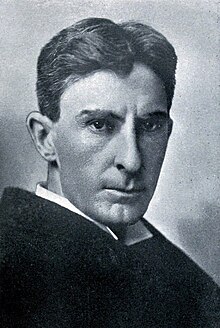Thomas Dixon Jr.
| Thomas Dixon Jr. | |
|---|---|
 | |
| Lahir | Thomas Frederick Dixon Jr. 11 Januari 1864 Shelby, Carolina Utara, Amerika Serikat |
| Meninggal | 3 April 1946 (umur 82) Raleigh, Carolina Utara, Amerika Serikat |
| Almamater | Wake Forest College Universitas Johns Hopkins Greensboro Law School |
| Pekerjaan |
|
| Dikenal atas | Advokasi terhadap supremasi kulit putih |
| Karya terkenal | The Clansman (sumber dari The Birth of a Nation) The Leopard's Spots |
| Gaya | Romansa sejarah |
| Gerakan politik | Lost Cause of the Confederacy |
| Suami/istri | Harriet Bussey (1886–1937) Madelyn Donovan (1939–1946) |
| Anak | 3 |
| Kerabat | Amzi Clarence Dixon |
Thomas Frederick Dixon Jr. (11 Januari 1864 – 3 April 1946) adalah seorang tokoh supremasi kulit putih, pendeta Gereja Baptis, politikus, pengacara, penceramah, novelis, pengarang sandiwara dan pembuat film asal Amerika Serikat. Dijuluki sebagai "rasis profesional",[1] Dixon menulis dua novel berpenjualan tertinggi, The Leopard's Spots: A Romance of the White Man's Burden – 1865–1900 (1902) dan The Clansman: A Historical Romance of the Ku Klux Klan (1905), yang meromantisasi supremasi kulit putih, mendukung Lost Cause of the Confederacy, menentang hak kesetaraan untuk orang-orang kulit hitam, dan memuliakan Ku Klux Klan sebagai pahlawan. Sutradara D. W. Griffith mengadaptasi The Clansman ke layar lebar dengan judul The Birth of a Nation (1915)
Referensi
[sunting | sunting sumber]- ^ Benbow, Mark E. (October 2010). "Birth of a Quotation: Woodrow Wilson and 'Like Writing History with Lightning'". Journal of the Gilded Age and Progressive Era. 9 (4): 509–533. doi:10.1017/S1537781400004242. JSTOR 20799409.
However, Dixon might be best described as a professional racist who made his living writing books and plays attacking the presence of African Americans in the United States. A firm believer not only in white supremacy, but also in the "degeneration" of blacks after slavery ended, Dixon thought the ideal solution to America's racial problems was to deport all blacks to Africa.
Daftar pustaka
[sunting | sunting sumber]- Lehr, Dick (2017). The birth of a movement : how "Birth of a Nation" ignited the battle for civil rights (edisi ke-2nd). New York: PublicAffairs. ISBN 9781586489878.
- Gillespie, Michele K.; Hall, Randal L. (2006). Thomas Dixon Jr. and the Birth of Modern America. Louisiana State University Press. ISBN 0-8071-3130-X.
- Slide, Anthony (2004). American Racist: The Life and Films of Thomas Dixon. Lexington, Kentucky: University Press of Kentucky. ISBN 0-8131-2328-3.
- McGee, Brian R. (2000). "Thomas Dixon's The Clansman: Radicals, Reactionaries, and the Anticipated Utopia". Southern Communication Journal. 65 (4): 300–317. doi:10.1080/10417940009373178.
- McGee, Brian R. "The Argument from Definition Revised: Race and Definition in the Progressive Era", pp. 141–158, Argumentation and Advocacy, Vol. 35 (1999)
- Gilmore, Glenda Elizabeth. Gender and Jim Crow: Women and the Politics of White Supremacy in North Carolina, 1986-1920. Chapel Hill: The University of North Carolina Press, 1996. ISBN 0-8078-2287-6
- Williamson, Joel. A Rage for Order: Black-White Relations in the American South Since Emancipation, Oxford, 1986. ISBN 0-19-504025-2
- Roberts, Samuel K. (1980). "Kelly Miller and Thomas Dixon Jr. on Blacks in American Civilization". Phylon. 41 (2): 202–209. doi:10.2307/274972. JSTOR 274972.
- Cook, Raymond A. (1974). Thomas Dixon
 . Twayne. ISBN 0-8057-0206-7.
. Twayne. ISBN 0-8057-0206-7. - Davenport, F. Garvin, Jr. (August 1970). "Thomas Dixon's Mythology of Southern History". Journal of Southern History. 36 (3): 350–367. doi:10.2307/2206199. JSTOR 2206199.
- Bloomfield, Maxwell (1964). "Dixon's The Leopard's Spots: A Study in Popular Racism". American Quarterly. 16 (3): 387–401. doi:10.2307/2710931. JSTOR 2710931.
Pranala luar
[sunting | sunting sumber]- Historical Information from Historical Marker Database
- Karya Thomas Dixon Jr. di Project Gutenberg
- Karya oleh/tentang Thomas Dixon Jr. di Internet Archive (pencarian dioptimalkan untuk situs non-Beta)
- Karya Thomas Dixon Jr. di LibriVox (buku suara domain umum)

- (Inggris) Thomas Dixon Jr. di Find a Grave
- Full version of The Clansman
- Thomas F. Dixon Jr. di IMDb (dalam bahasa Inggris)
